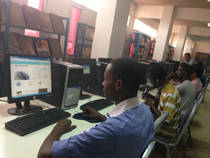UNESCO World Library of Science

© Future University-Sudan/ Salih Dafalla
Roll-out pilot phase training session in the Future University in Sudan of the World Library of Science (WLoS) Project
The UNESCO World Library of Science (WLoS) is a free online resource for science learning.
It contains hundreds of peer-reviewed articles that use text, pictures, illustrations, and videos to make scientific concepts easy-to-understand. The WLoS is also a community hub for learning. Users can join classes, start groups and connect with other learners.
Developed through the joint efforts of UNESCO, Nature Education and Roche, the WLoS aims to inspire curiosity, facilitate collaboration and foster scientific discovery.
Specifically, the World Library of Science seeks to make science learning accessible to all students by:
- Equalizing learning opportunities. The WLoS is open to all at no cost. It provides students, regardless of race, gender, geography or economic circumstances, access to high-quality educational material. UNESCO dedicates special attention to training teachers and students in developing countries in how to use the WLoS, accelerating science learning in disadvantaged regions.
- Improving the quality of teaching and learning. The WLoS supports teachers and students worldwide by giving educators concrete ideas about how to present complex scientific concepts and students resources to fuel and complement their learning. The website provides rich multimedia content that is up-to-date and peer-reviewed.
- Strengthening science education. The WLoS connects natural curiosity to science learning. Scientific understanding is foundational to sustainable development and prepares learners for employment in knowledge economies.
- Promoting the use of open educational resources. The WLoS content is entirely open; it can be tailored, shared and re-purposed according to users’ needs. The WLoS is founded on the idea that educational content and scientific knowledge should be free and accessible to all.
- Connecting communities of students and teachers. The WLoS is more than just a traditional library: it is a dynamic resource that allows users to collaborate with others, personalize their learning experience, pose and answer questions, and collaborate with others while exploring scientific concepts. The WLoS fosters knowledge-sharing and peer-learning.

